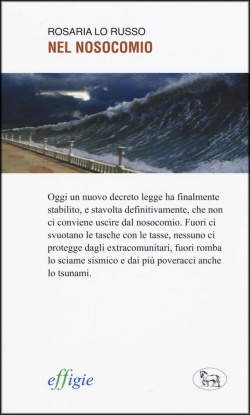Editorial
by Francesca Del Moro
Dealing with the theme of incest, the selected poets show a variety of styles and perspectives. Inspired by a true story, the dense and refined lines by Silvia Secco end a scene of daily life with a tragic epilogue revealing that in most cases the horror lies hidden behind a seemingly ordinary childhood. Both Giorgia Monti and Alessandro Silva take the point of view of the victims abused by their father and ignored by their mother, but with very different approaches: Monti sees the rape through the innocent and delicate sensibility of a little girl, whereas Silva adopts the more explicit and harsh language of a grown-up woman. Daniele Barbieri bravely undertakes the task of entering the abuser’s mind, with his couplets inexorably falling down into a vortex of love and blood till the bitter end. Alberto Cini raises the curtain of the general disapproval revealing that incest has always been connatural to humans: over the centuries, they have adored it in their myths, sublimed it in literature, dreamt about it in their hearts.
Simple or complex incest
by Alberto Cini
a well-finished and fatuous theatre
where the intercourse between relatives
takes place on the lit up stage’s boards
they are so talented (background muttering)
and if it were rape? (background muttering)
and if it were sacred? (background muttering)
a fiend suddenly comes out of the backstage
with a crow’s beak and owl’s eyes
and screams to the speechless audience
to the spectators still conservative deep down
“I scream the story and scream the silence!
I scream the incestuous Neanderthal being
who made this habit disappear!
the mask of the pharaohs’ progeny
and the Incas’ undiluted blood
and Abraham’s wife sister and prostitute
the unaware drunk Lot whose daughters
will generate entire populations
Oedipus, unaware as well,
who blinds himself
and generates Western civilization
I scream the silence
of the little girls and the little boys
a story by Anaïs Nin
the six-year-old Isabelle Aubry
the drawings on the psychologists’ desk
the links to pornographic websites
everyone’s dreams rolling away
from the criminal justice system
in case of adults being in a relation of adoption
it is not a crime
the lady with the cat living next door,
my grandmother telling me:
you know, they used to leave her with her grandpa
then the child was born dead,
she did not want to get married anymore!”
the crow disappears
the owl closes its eyelids
the curtain falls, darkness exists.
you are my mother and my daughter and yet we will part
by Daniele Barbieri
you are my mother and my daughter and yet we will part
we will part all the same, in spite of the innards
that unite us tightly, in spite of the strong
bond, in spite of it all, in spite of it all,
in spite of the blood that we have in common,
in the blood goes desire, in the blood runs your bond,
you are my mother and my daughter and forever we’ll part
if the fluids don’t mingle anymore, even your blood
is already dry
The hands that clutched her, at night*
by Alessandro Silva
The wardrobe. With a tartan umbrella,
of a vibrant amaranth, like the nipple
chewed by the bees of his teeth.
He made it in the peacock’s sweat
after twelve married lives
but did not remove my heart from the creaking
rock of the wedding den.
The paper bag, between the kitchen
and the badly washed cups, is pregnant
with oranges and a pomegranate, the only
creature that joins its blood
in deep rows of teeth without
wasting lies. I will be forever
confused, more than one response
inside an ink well that is dead like
the window’s empty orbit. Now
he sees a body of tongues that are still warm,
severed from the fire dance.
My twenty-one-year-old body left
eating the height of his hips
slipped into my mouth, a contagious
fire. It was nice when the long oil
thunderbolt was born. My mother
had my teeth pulled out because
“Your breath stinks of a cold man”.
*Those hands that clutched
her at night, by Yves Bonnefoy.
Calling a father a father
by Giorgia Monti
Your hands
smelled like charcoal.
I was kinder
under the moon.
Rock crystal
ossified by breath.
Inside the tremor
I felt escape routes
on your back.
Spaces were thin.
With a ringing in the ears
where -expanded-
silence entered.
While waiting
I prepared for fear
as for a grace.
A woman’s pale blue shadow
beyond the door
she did not open.
You were proud.
You blew empty air
on my hair.
That beard’s needle
just that one
the offense.
Father, how can you
sting a rose?
The little dolls climb the stairs
by Silvia Secco
(To Fortuna Loffredo)
The little dolls climb the stairs
of the buildings with scraped knees
and slippers. They bear names like
candies. They ring their friends
to go play on the terraces cleared up
of antennas, to unite the dots of moles
in the shape of a wolf. They wear
favourite t-shirts with wings
they count their years, up to six. Then
they close their mouths with their hands
they scream their fathers’ face. They jump,
they fly down eight floors.
Nel nosocomio
by Rosaria Lo Russo
Two reinforced concrete buildings, Sixties architecture: one all glass and neon lights, the other a block of Japanese-style studio apartments, with no windows. This is the setting of a dystopia in verses, a new Dantesque Underworld filled with the same anguish permeating the short story Seven Floors by Dino Buzzati, which is also set in a hospital.
In Rosaria Lo Russo’s hospital, hospitalization extends indefinitely, in a condition of amortality that crowns today’s myth of eternal youth, which must be pursued at all costs–through zumba, yoga, fitness and cosmetic surgery. Dead souls lie in the constantly reinvigorated bodies of the lords of pleasure who, day after day, follow a strict schedule of blood tests, sport, games and soap operas on TV. And there is no lack of pure pleasure either, as it is ensured by the administration of food and sex–this last through a water jet by the mythical name of Chloris. To be allowed into the hospital you only need to have deep pockets and comply with bourgeois principles, that is to boast a happy family, two children and possibly a dog. Anonymity is guaranteed–after all there is no need for names here, nor for any other kind of distinction among individuals. The main goal of the institution is to leave things the way they are, and in this respect Eastern disciplines and Western philosophy are a perfect match: contemplation and dynamic activities work together as opposing forces that in the end paralyze the patients in their status of placid nullities. Rosaria leads us through the hospital, leaving its inhabitants–professionals and patients alike–the task to describe it, while little by little we find out, horrified, that the reality depicted is actually that of our own life. Modern man’s life deprived of ideals and ideologies, of true interpersonal relationships, where you don’t worry about the future and you only care about prolonging your existence as much as you can, against all threats–deliberately alluded to when needed, such as taxes, immigrants, earthquake swarms–and preserving at all costs your well-being, the highest value together with the money that allows you to buy it. There is no difference between spiritual and physical well-being: in this sense Doctor Freud, the beautician who promotes self-confidence, the personal trainer and the yoga teachers share the same goal, which is to give instructions to bodies and minds in order to stabilize them in a pathological condition. A condition perfectly summed up by the epigraph of a poem in the third section, a quote from David Foster Wallace: How we all […] got glazed and apolitical, also torpid, docile, our minds in a deep loose neutral gear. That’s how ‘daddy’ likes it, a plastic caricature of God, the creator of this world who in the end passes the baton to the new, ambitious, director–two characters in which we recognize the protagonists of our Italian politics. Barricaded inside the hospital, the patients look terrified at the dormitory materializing in front of them, where the third–and last–section of the book is set, a homage to the Spoon River Anthology. This section deals mostly with cases of ‘famous’ deaths from the news: Pippa Bacca, Mia Martini, child suicide bombers, businessmen committing suicide, Sulcis miners, and the young boy who died of a heart-attack while playing football. These are just some of the many ways to end up in the dormitory, which–despite the patients refusing to admit it–awaits them all. That’s how this powerful allegory of human existence comes to an end, an allegory in which Rosaria Lo Russo alternates tragic and absurd scenarios, drawing from recent events as well as from literary models, combining linguistic refinement with spoken language, and ranging from short to quite long poems like the amazing one on water, and an allegorical bestiary.
Rosaria Lo Russo
Nel nosocomio
Effigie edizioni, 2016

